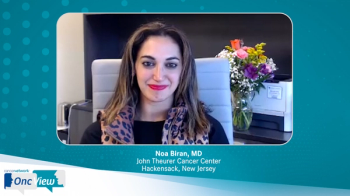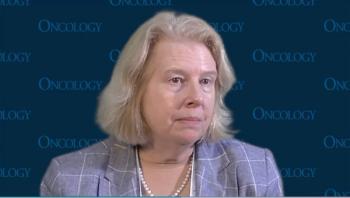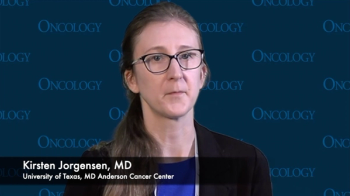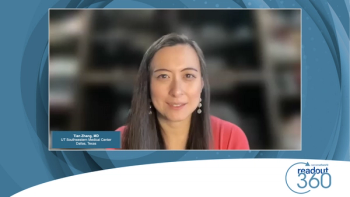
Clinical trials highlight benefits, including radiographic progression-free survival following treatment with radioligand 177Lu-PSMA-617 in pretreated patients with metastatic castration-resistant prostate cancer.

Your AI-Trained Oncology Knowledge Connection!


Clinical trials highlight benefits, including radiographic progression-free survival following treatment with radioligand 177Lu-PSMA-617 in pretreated patients with metastatic castration-resistant prostate cancer.

Shaji Kumar, MD, presents data from an updated analysis of the MAIA trial investigating daratumumab/lenalidomide/dexamethasone for transplant-ineligible NDMM.

The panel compares data between the three presented quadruplet combination regimens for NDMM, and which they would consider for older, frail patients.

Early data from ongoing clinical trials suggest the potential safety and efficacy of novel radium-223 combinations as treatment for metastatic castration-resistant prostate cancer.

Noa Biran, MD, offers insights on ongoing research with bispecific antibodies in multiple myeloma.

A comprehensive discussion on bispecific antibodies and T-cell engagers in the treatment of multiple myeloma.

Experts on graft-vs-host disease discuss patient monitoring and education, and a patient details his experience with GVHD.

A panel of GVHD experts give a comprehensive overview of the presentations of acute and chronic graft-vs-host disease.

An expert from Dana-Farber Cancer Institute discusses findings from the final overall survival analysis of the phase 3 ENGOT-OV16/NOVA trial.

The use of palliative care in ovarian cancer resulted in a decrease in overall readmissions and index hospitalization costs.

Minimally invasive surgery for interval debulking resulted in a lower mortality at the 30- and 90-day time points compared with laparotomy in advanced ovarian cancer.

Current clinical trials look to assess 177Lu-PSMA-617 in combination with other therapies including androgen deprivation therapy and docetaxel.

An expert from Dana-Farber Cancer Institute indicates that patients with prostate cancer who have 1 risk factor should undergo salvage radiotherapy following radical prostatectomy before their prostate-specific antigen level rises above 0.25 ng/ml.

Laura Sanza, PhD, MPAS, PA-C, leads a discussion on communicating adverse events with patients and mitigating potential toxicities.

A brief discussion elucidating the patient and caregiver perspectives when selecting a treatment option for renal cell carcinoma.

Alexander Lesokhin, MD, presents data from an interim analysis of the GMMG-CONCEPT trial investigating an isatuximab-based quadruplet regimen for high-risk NDMM.

The panel reviews possible treatment approaches for patients with high-risk NDMM, and how MRD negativity affects their decision making.

Myeloma experts give an overview of allogeneic CAR T-cell therapy and other technology advances in MM.

Noa Biran, MD, and David Siegel, MD, discuss how CAR T-cell availability has impacted the field of multiple myeloma.

An expert from Weill Cornell Medicine highlights key clinical data indicating the benefits of radium-223 in the treatment of patients with metastatic castration-resistant prostate cancer.

Experts on graft-vs-host disease review GVHD and methods of prophylaxis preceding transplant.

Hope S. Rugo, MD, FASCO, and Paolo Tarantino, MD, offer closing remarks on the growing field of HER2-low and triple-negative breast cancer.

A panel of experts and a patient with graft-vs-host disease discuss the relationship between transplantation and GVHD.

Breast cancer experts talk through their approaches to treating HER2-low triple-negative breast cancer.

The panel wraps up their discussion with a review of how they would approach treating frontline non-clear cell RCC.

The panel shares how they would treat a patient with advanced RCC after disease progression on adjuvant pembrolizumab.

Tian Zhang, MD, explains whether recent data from ESMO 2022 has changed their approach to adjuvant immune therapy in advanced RCC.

The risk of radionuclide exposure to the public reflects one reason urologists need to collaborate with radiation oncologists when administering radiopharmaceuticals to patients with prostate cancer.

Switching out beta emitters for alpha emitters, including radium-223, is one way to improve radiopharmaceutical treatment of prostate cancer, according to an expert from Weill Cornell Medicine.

Data demonstrate the feasibility of automated glomerular filtration rate prediction to decide between partial nephrectomy and radical nephrectomy in kidney cancer, according to an expert from the Cleveland Clinic.